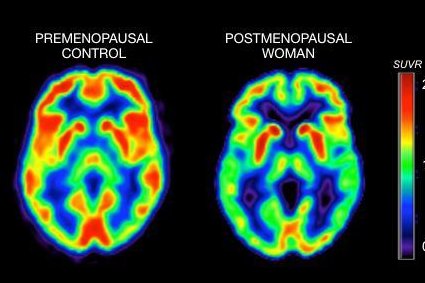The scan to the left shows brain activity in a pre-menopausal woman; the scan to the right shows brain activity in a postmenopausal woman. The color scale reflects brain activity, with brighter colors indicating more activity, and darker colors indicating lower activity. Photo courtesy WCM
Oct. 11 (UPI) -- A recent study found that menopause causes metabolic changes in the brain that can increase the risk of developing Alzheimer's disease in women.
Alzheimer's disease affects more than 5 million Americans, including one-third of Americans over 85 years old. Women are diagnosed with Alzheimer's disease more often than men.
The study, by researchers at Weill Cornell Medicine and the University of Arizona Health Sciences, was published Tuesday in Plos One.
"This study suggests there may be a critical window of opportunity, when women are in their 40s and 50s, to detect metabolic signs of higher Alzheimer's risk and apply strategies to reduce that risk," Dr. Lisa Mosconi, associate director of the Alzheimer's Prevention Clinic at Weill Cornell Medicine and NewYork-Presbyterian, said in a news release.
Researchers used positron emission tomography, or PET, scans to measure the use of glucose in the brains of 43 healthy women age 40 to 60 years old. Fifteen of the women were pre-menopausal, 14 were transitioning to menopause, or peri-menopausal, and 14 were menopausal.
The study showed that women who had undergone menopause or were peri-menopausal had significantly lower levels of glucose metabolism in key brain regions compared to women who were pre-menopausal. Low levels of glucose metabolism in the brain has been linked to the earliest development of Alzheimer's disease.
"Our findings show that the loss of estrogen in menopause doesn't just diminish fertility," Mosconi said. "It also means the loss of a key neuroprotective element in the female brain and a higher vulnerability to brain aging and Alzheimer's disease. We urgently need to address these problems because, currently, 850 million women worldwide are entering or have entered menopause. Our studies demonstrate that women need medical attention in their 40s, well in advance of any endocrine or neurological symptoms."
Menopause has been known to cause brain-related symptoms such as depression, anxiety, insomnia and cognitive defects. Researchers believe these declines are caused in part by declines in estrogen levels.
"Our work indicates that women may need antioxidants to protect their brain activity and mitochondria in combination with strategies to maintain estrogen levels," Mosconi said. "We believe that more research is needed to test efficacy and safety of hormonal-replacement therapies at the very early stages of menopause, and to correlate hormonal changes with risk of Alzheimer's. This is a major priority at our Alzheimer's Prevention Clinic."















